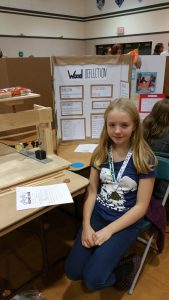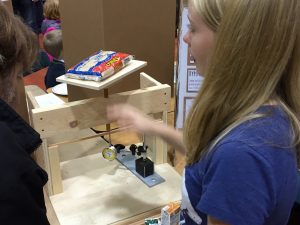Science Fair – Sharing Learning
November 4, 2016 - 3 minutes readBICS held it’s second annual Science Fair on November 2nd, 2016. There were over 60 participants and the variety and depth of learning on display were impressive. I asked one participant, Grade Six student Miranda, to write about her experiences with the Science Fair.
In speaking to her at the Fair, I was impressed by her original idea, the careful methodology of testing her hypothesis which included building an apparatus to conduct her experiment, and her ability to reflect on her learning and communicate her findings effectively to an audience likely unfamiliar with her topic. I hope that in reading her post below you will see so much of what we hope for in the learning of our students and the tremendous value of hosting this fair. I’m grateful to the Science Fair Committee for all of their work in hosting this event.
Scott Slater
“Deflection” – My Learning, Miranda Forster
Every year B.I.C.S. holds a science fair. It is open to all students in grades 1-7, and h eld in the B.I.C.S. gym. It is non-competitive, with all students receiving a participant medal.
eld in the B.I.C.S. gym. It is non-competitive, with all students receiving a participant medal.
This year I entered the science fair for the second time, and my sister (in grade one) entered as well. My idea was to test the deflection in different types of wood.
My question was: what type of wood will deflect the least? Deflection is the amount that an object bends under pressure. I tested it by placing wood samples on a wooden frame and putting a 2-pound weight on it, and then measuring the deflection of the wood with a dial indicator.
I think that my results were fairly accurate because the tool I used was very reliable. Something to take into account is that the wood seemed to get weaker as I demonstrated my experiment to more and more people, but when doing the real experiment the wood was unused. I was able to do the experiment a few times, and the results were the same. I also know that the dimensions of the wood were the same, so that did not affect the results.
 Tests similar to this can be important, because when building a house, for example, you want to know which materials will be the strongest.
Tests similar to this can be important, because when building a house, for example, you want to know which materials will be the strongest.
I liked this project because it was different from the project I did last year, which was more to do with biology than engineering. I also enjoyed collecting the data using precise measurements from a dial indicator.
I am already looking forward to next year’s science fair!
Thank you to the organizing committee of the Science Fair: Wendy Cellik, Carla Young and Ann Walters!
Miranda
Recent Comments